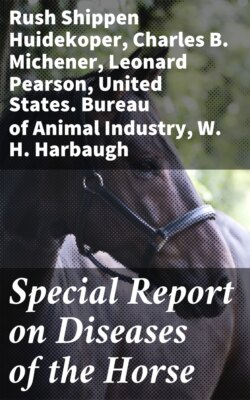Читать книгу Special Report on Diseases of the Horse - Charles B. Michener - Страница 59
На сайте Литреса книга снята с продажи.
PERITONITIS.
ОглавлениеPeritonitis is an inflammation of the serous membrane lining the cavity of and covering the viscera contained within the abdomen. It is very rare to see a case of primary peritonitis. It is, however, somewhat common as a secondary disease from extension of the inflammatory action involving organs covered by the peritoneum. Peritonitis is often caused by injuries, as punctured wounds of the abdomen, severe blows or kicks, or, as is still more common, following the operation of castration. It follows strangulated hernia, invagination, or rupture of the stomach, intestines, liver, or womb.
Symptoms.—Peritonitis is mostly preceded by a chill; the horse is not disposed to move, and, if compelled to do so, moves with a stiff or sore gait; he paws with the front feet and may strike at his belly with the hind ones; lies down very carefully; as the pain is increased while down, he maintains the standing position during most of the time; he walks uneasily about the stall. Constipation is usually present. Pressure on the belly causes acute pain, and the horse will bite, strike, or kick if so disturbed; the abdomen is tucked up; the extremities are fine and cold. The temperature is higher than normal, reaching from 102° to 104° F. The pulse in peritonitis is rather characteristic; it is quickened, beating from 70 to 90 beats a minute, and is hard and wiry. This peculiarity of the pulse occurs in inflammation of the serous membrane, and if accompanied with colicky symptoms, and, in particular, if following any injuries, accidental or surgical, of the peritoneum, there is reason to think that peritonitis is present. Peritonitis in the horse is mostly fatal when it is at all extensive. If death does not occur in a short time, the inflammation assumes a chronic form, in which there is an extensive effusion of water in the cavity of the belly, constituting what is known as ascites, and which, as a rule, results in death.
Treatment.—The treatment of peritonitis is somewhat like that of enteritis. Opium in powder, 1 to 2 drams, with calomel, one-half dram, is to be given every two, three, or four hours, and constitutes the main dependence in this disease. Extensive counterirritants over the belly, consisting of mustard plasters, applications of mercurial ointment, turpentine stupes, or even mild blisters, are recommended. Purgatives must never be given during this complaint. Should we desire to move the bowels, it can be done by gentle enemas, though it is seldom necessary to resort even to this.
